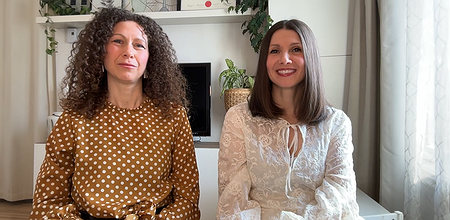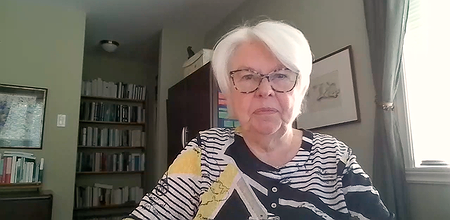- Understand the CBT model as it applies to couples
- Assess the problems and set up a therapy plan
- Implement evidence-based CBT strategies in a couple context
- Integrate mindfulness, motivational interviewing, DBT and positive psychology into the treatment of relationship problems
CBT for Couples and Relationship Problems
Dr. John Ludgate, Psychologist
Master evidence-based couples CBT from a Beck-trained expert: integrate Gottman, DBT, and mindfulness for lasting relationship change
Excerpt:
- 3h of continuing education
- 23 lessons that last from 5 to 15 minutes each
- 1 certificate of achievement
- 1 PowerPoint
- 1 bibliography
- 1 course evaluation
- 7-day money back guarantee
- Unlimited access
- 97% of participants who completed the satisfaction survey declare they would recommend this course to a colleague
Overview
Treating a couple means working with two people who occupy the same relationship but live in different realities. Each partner's cognitive appraisal shapes their emotional response, which triggers the other's behavior, which reinforces the first partner's beliefs. This reciprocal causality—where cause and effect loop continuously—makes couples work fundamentally different from individual therapy.
In this course, you will learn to apply CBT principles to the unique complexity of couples therapy. You will develop skills to assess and intervene at both the individual and relational level. Dr. John Ludgate, trained directly by Aaron Beck, will guide you through evidence-based techniques refined over 30 years of clinical practice.
You will learn to conduct thorough cognitive and behavioral assessments that capture each partner's perspective while identifying systemic patterns. You will develop skills to conceptualize relationship problems within a shared framework that both partners can understand and use. You will practice strategies to prevent common therapeutic pitfalls like triangulation, over-identification, and the trap of treating individuals rather than the relationship itself.
The course will teach you to implement core CBT interventions adapted for couples, including:
- Cognitive reappraisal techniques for relationship-specific distortions
- Communication training using speaker-listener protocols
- Problem-solving frameworks for joint decision-making
- Behavioral exchange strategies to increase positive reciprocity
- Conflict management using time-out and emotion regulation skills
You will integrate mindfulness and acceptance-based approaches into standard CBT protocols. You will learn when and how to apply DBT emotion regulation strategies for high-conflict couples. You will discover positive psychology interventions that shift focus from eliminating negatives to building relationship strengths.
The training addresses practical clinical challenges throughout: managing psychiatric disorders in one or both partners, setting and enforcing ground rules for in-session conflict, determining when to see partners separately versus together, and preventing the erosion of therapeutic gains over time.
You will also learn Gottman's research-based interventions, including antidotes to the "Four Horsemen" communication patterns. You will practice motivational interviewing techniques to explore ambivalence about relationship change. You will develop skills to help couples move from complaints to requests, from blame to shared responsibility.
By the end of this course, you will have a structured roadmap for applying CBT to couples. You will be equipped to help partners recognize how their cognitive appraisals maintain relationship distress. You will guide couples toward healthier interaction patterns grounded in evidence-based techniques that have demonstrated effectiveness across diverse relationship problems.
Accreditation
Collège des médecins du Québec
For physicians who practice psychotherapy, training recognized by the Ordre des psychologues du Québec is automatically considered as activities adopted by the Collège des médecins, in accordance with Article 3 of the Regulation.
For physicians who do not practice psychotherapy, the College evaluates each recognition request based on the following criteria:
- the relevance of the activity to the practice of the profession
- the skills and experience of the trainer
- the quality of the content and its adequacy with the physician's practice
- the pedagogical framework of the activity
- the quality of the documentation provided
- compliance with the training objectives set out in the regulation
- the presence of a certificate of participation or an evaluation
About the expert

Dr. John Ludgate is a licensed psychologist and Founding Fellow of the Academy of Cognitive Therapy, where he serves on the Credentialing Committee. He received his clinical training directly under Dr. Aaron Beck, the founder of Cognitive Therapy, at the Center for Cognitive Therapy.
With over 30 years of clinical practice, Dr. Ludgate specializes in treating mood disorders, anxiety disorders, and relationship problems at the CBT Center of Western North Carolina in Asheville. He maintains an active clinical practice while providing advanced training and supervision in Cognitive Behavioral Therapy to mental health professionals nationally and internationally.
Dr. Ludgate has authored numerous influential books in the field, including CBT Couples Toolbox, Maximizing Psychotherapeutic Gains and Preventing Relapse in Emotionally Distressed Clients, Cognitive Therapy with Inpatients: Developing a Cognitive Milieu, Overcoming Compassion Fatigue: A Practical Resilience Workbook, and Heal Yourself: A CBT Approach to Reducing Therapist Distress and Increasing Therapeutic Effectiveness.
He has published extensively in peer-reviewed journals and contributed chapters to major cognitive behavioral therapy texts. His presentations and workshops on CBT approaches to anxiety, depression, and relationship problems have reached audiences across North America, Europe, and Asia. His work focuses on translating evidence-based research into practical clinical applications that therapists can immediately implement in their practice.
Learning objectives
Learning material
A theoretical course illustrated with clinical examples. This course is composed of videos of 5 to 15 minutes each. The PowerPoint of the course to download.
Syllabus
- PowerPoint
- 1. Introduction
-
Theoretical Foundations of Couples CBT
- 2. Historical Overview of Couple CBT
- 3. CBT Model Applied to Couples
- 4. Applications of CBT for Relationship Approaches
- 5. Overview of CBT for Couples
- 6. Ground Rules
-
Assessment and Cognitive Exploration
- 7. Assessment Phase
- 8. Scales and Questionnaires
- 9. Assessment of Cognitive and Behavioral Factors
- 10. Identifying Thought-Feeling Link
- 11. Cognitive Appraisal- Components
- 12. Recognizing Distortions
- 13. Cognitive Re-Appraisal Strategies
- 14. Assumptions v Actuality
-
Intervention Strategies
- 15. Behavioral Interventions
- 16. Effective Communication
- 17. The Four Horsemen (Gottman)
- 18. Problem Solving for Couples
- 19. Mindfulness Strategies
- 20. Other ACT& Mindfulness Strategies
- 21. Positive Psychology Applied to Couples
- 22. Other Issues
- 23. Conclusion
- Bibliography
-
Additional Resources
- Handouts
CE Credits
Download a certificate of successful completion.
Audience
This course is intended for mental health professionals.
Your comments
"Very knowledgeable therapist"
A psychologist (Canada)
"I appreciate that Dr. Ludgate stressed his availability to answer questions. Very good examples were given to accompany the slides."
A psychologist (Canada)
"Well organized, clearly presented,very good slides, and easy to follow"
A psychologist (Canada)
Registration
Ask a question
Do you have a question? Then email us at contact@asadis.net
Frequently asked questions
-
Is there an evaluation at the end of the course?
To validate the achievement of the learning objectives, a final evaluation in the form of true/false questions is required. It must be completed in order to obtain the certificate of completion.
In addition, an optional self-assessment is offered at the beginning and end of the course, allowing you to measure your progress on the targeted skills.
These evaluations are not graded and are intended primarily to support your professional reflection.
-
I have a disability. Can I receive specific support?
Yes! This training is offered as a pre-recorded video format, without subtitles. If you have a disability, we can provide an adapted alternative (technical assistance for viewing or individual supervision). For any request, please contact our disability coordinator at the following address: contact@asadis.net
-
How long do I have access to the course?
After your registration, the course is accessible anytime and from anywhere with unlimited access.
-
When does the course start?
That is entirely up to you! When you buy a course, you'll receive an access link that you can activate when you want.
-
Is there a student rate?
Yes there is! To learn more, email us at contact@asadis.net.
You may also be interested in:
Legal notice
The courses offered by ASADIS are accredited by different professional organisations. In addition, ASADIS is approved by the Canadian Psychological Association to offer continuing education for psychologists. ASADIS maintains responsibility for the program.
The CPA’s approval of an individual, group, or organization as a CE Sponsor or Provider is restricted to the activities described in the approved application or annual report form. The CPA’s approval does not extend to any other CE activity the Sponsor or Provider might offer. In granting its approval, the CPA assumes no legal or financial obligations to Sponsors, Providers, or to those individuals who might participate in a Sponsor or Provider’s CE activities or programs. Further, responsibility for the content, provision, and delivery of any CE activity approved by the CPA remains that of the CE Sponsor or Provider. The CPA disclaims all legal liability associated with the content, provision, and delivery of the approved CE activity.





